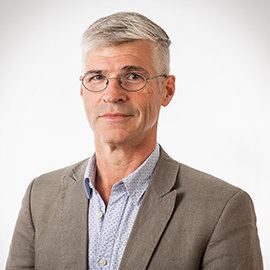Ruud Henkes
“Fluid dynamics in the Netherlands rests on the foundations of 100 years of research and applications, and has been united for 30 years in the J.M. Burgerscentrum, the national research school for fluid mechanics. With about 80 scientific PhD graduations per year, and the many proven applications, this deserves full appreciation. The Netherlands can be proud to have this knowledge and expertise in-house. Let's visibly cherish it and use it with enormous decisiveness to solve societal challenges. In this way, fluid dynamics will provide guidance for the future in the Netherlands”.

Ruud Henkes
Professor fluid mechanics, Scientific Director of the J.M. Burgerscentrum
The appointment of Jan Burgers as the first professor in this field more than 100 years ago in 1918 in Delft feels like a kind of big bang of fluid dynamics in the Netherlands. After his doctorate in Leiden under the famous Paul Ehrenfest, he turned away from theoretical physics with the developments in quantum physics and devoted himself entirely to the engineering science of fluid dynamics. Professor Jan Burgers was driven by the versatility of fluid dynamics. Scientifically he became known for the “Burgers equation”, which can be used as a model for the dynamics of flow turbulence. In the laboratory with his colleagues, he developed measurement methods for fluid flow. And with the developed measurement and calculation methods, he solved engineering problems for the Netherlands. An example is his design for the ventilation system of the Maastunnel in Rotterdam and for the mines in Limburg.
The versatility of fluid dynamics, as originally propagated by Burgers, can now be found in great detail in the J.M. Burgerscentrum. Here, 250 scientific staff and their 350 PhD students have joined forces. Fluid mechanics encompasses both science (with a multitude of publications in leading journals for fundamental fluid mechanics) and technology (with the same multitude of publications in applied fluid mechanics journals). Together they provide the tools, in particular calculation methods (with the numerical simulation software) and the measurement methods (with the measurement hardware), to understand flows in the variety of societal challenges now and in the future. We can classify them into six themes: climate, environment, energy transition, health, food production, and high-tech products.
The Burgerscentrum and fluid dynamics in the Netherlands are highly regarded and internationally renowned for their top quality. But there is also a downside to the pride of the 100-year fluid tradition: a perception that engineering sciences can maintain it all themselves, without the large financial contributions that new attractive disciplines, such as quantum, nano, and artificial intelligence, manage to attract. With the “Flow to the Future in the Netherlands” initiative, we want to clarify the impact of fluid dynamics and encourage policymakers to invest more in this knowledge and expertise that is crucial to the Netherlands (and the world).
For further information: R.A.W.M.Henkes@tudelft.nl

